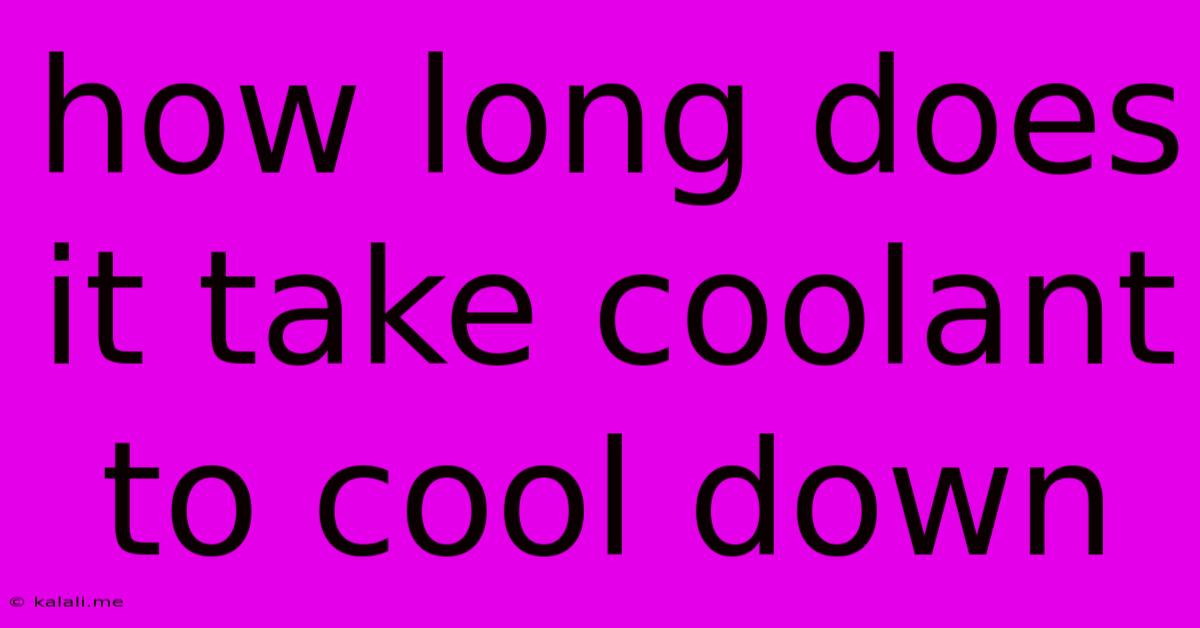How Long Does It Take Coolant To Cool Down
Kalali
Jun 02, 2025 · 3 min read

Table of Contents
How Long Does It Take Coolant to Cool Down? A Comprehensive Guide
Meta Description: Discover how long it takes your engine coolant to cool down after turning off your car. We explore factors affecting cool-down time and safety tips for handling hot coolant.
Knowing how long it takes your engine coolant to cool down is crucial for vehicle maintenance and safety. There's no single answer, as cool-down time depends on several factors. This guide will break down the process and help you understand what influences this crucial timeframe.
Factors Affecting Coolant Cool-Down Time
Several factors determine how long your engine coolant takes to cool down after you switch off your engine:
-
Engine Size and Type: Larger engines, especially those with higher performance, generate more heat and will take longer to cool down. The type of engine (gasoline, diesel, etc.) also plays a role, with some engines retaining heat more than others.
-
Ambient Temperature: On a hot day, your coolant will take longer to cool compared to a cool day. The surrounding air temperature significantly impacts the rate of heat dissipation.
-
Coolant Type and Condition: The type of coolant used (conventional, extended life, etc.) and its condition (old, new, contaminated) influence its heat transfer properties. Older, degraded coolant may not cool as efficiently.
-
Vehicle's Cooling System: The efficiency of your vehicle's cooling system—including the radiator, water pump, thermostat, and fan—directly impacts how quickly the coolant loses heat. A malfunctioning component can significantly prolong cool-down time.
-
Driving Conditions: Intense driving, such as high speeds or heavy traffic, generates more heat and extends the cool-down period.
Typical Coolant Cool-Down Timeframes
While there's no definitive timeframe, here's a general guideline:
-
Under ideal conditions (moderate ambient temperature, moderate driving, efficient cooling system): You can expect your coolant to cool down significantly within 30-60 minutes. This doesn't mean it's completely cold, but cool enough to safely handle.
-
Under less ideal conditions (hot day, heavy driving, potential cooling system issues): It could take several hours for your coolant to reach a safe temperature.
Safety Precautions When Handling Hot Coolant
Always prioritize safety when dealing with your vehicle's cooling system. Hot coolant can cause severe burns. Here are some essential safety tips:
-
Never open the radiator cap immediately after turning off the engine. Wait at least 30 minutes, and preferably longer, especially on hot days or after strenuous driving.
-
Use appropriate safety gear. Wear protective gloves and eye protection when working near the cooling system.
-
Allow the coolant to cool completely before performing any maintenance or repairs.
-
If you're unsure about anything, consult a professional mechanic.
Understanding Coolant Temperature and Your Car's Health
Monitoring your coolant temperature is essential for maintaining your vehicle's health. Regularly checking your coolant level and ensuring your cooling system is functioning correctly can help prevent overheating and costly repairs.
Conclusion
The time it takes for your engine coolant to cool down is variable and depends on numerous factors. Prioritizing safety and understanding these factors will help you maintain your vehicle's cooling system and avoid potential hazards. Remember to always exercise caution when working with hot coolant.
Latest Posts
Latest Posts
-
It Was Pleasure To Talk With You
Jun 03, 2025
-
How Do You Create A Homescreen For Flashdrive
Jun 03, 2025
-
What Size Is A 8 Screw
Jun 03, 2025
-
How To Clean Table Saw Metal Surface
Jun 03, 2025
-
Can I Upload Samples Of Songs On I Imusic
Jun 03, 2025
Related Post
Thank you for visiting our website which covers about How Long Does It Take Coolant To Cool Down . We hope the information provided has been useful to you. Feel free to contact us if you have any questions or need further assistance. See you next time and don't miss to bookmark.